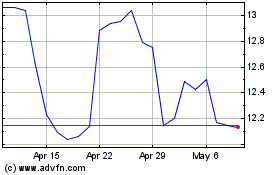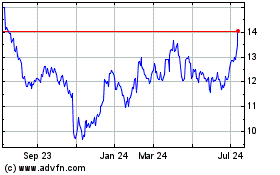By Christina Rogers, Peter Nicholas and Mike Colias
President Donald Trump told bosses of the Detroit three car
makers that he would work to ease environmental regulations, cut
corporate taxes and push for economic policies favorable to U.S.
manufacturing, in an effort to mend fences with an industry he
spent months criticizing.
In a breakfast meeting Tuesday, Mr. Trump pledged to speed up
regulatory reviews for permits and create a friendlier climate for
companies that want to invest in the U.S., stepping up his push to
curb the flow of jobs overseas.
"We're going to make the process much more simple for the oil
companies and everybody else that wants to do business in the
United States," Mr. Trump said, in an hourlong meeting with General
Motors Co.'s Mary Barra, Ford Motor Co.'s Mark Fields and Fiat
Chrysler Automobiles NV's Sergio Marchionne.
The commander-in-chief also reiterated that companies would pay
a steep price should they not comply with his "America First"
credo, echoing his Twitter messages in recent months threatening to
slap a border tax on companies moving factory work abroad.
At the start of the meeting, Mr. Trump pulled out the chair next
to him for Ms. Barra, who recently joined his economic policy team,
so she could sit down next to him. He went around the Roosevelt
Room and asked everyone to introduce themselves, beginning with
himself. "I'm Donald Trump," he said.
Before Tuesday's breakfast meeting, Mr. Trump tweeted: "I want
new plants to be built here for cars sold here!"
Persuading car makers to add new factories will be a tall order,
though. U.S. demand for cars and trucks is cooling, following seven
years of uninterrupted growth. The Detroit car makers have been
generally reluctant to build new auto-factories in the U.S., after
spending years getting rid of old plants they didn't need,
particularly during the bankruptcies of GM and Chrysler.
Most of the new plants built in the U.S. in recent years have
been by foreign auto makers like Volkswagen AG and Toyota Motor
Corp.
Mr. Trump, whose popularity with working-class voters helped
propel him to the White House, has blasted the auto industry for
importing cars for sale in the U.S., arguing it is coming at the
expense of American jobs. That has put auto-industry executives on
the defensive and led them to announce new investment in U.S. auto
plants in recent weeks, even though some of the plans had been in
the works for months or longer.
For much of his campaign, Mr. Trump targeted Ford, pointing to
the company's plans for a new $1.6 billion factory in Mexico to
build small cars currently produced in the U.S.
Ford has since scrapped those plans, opting to instead reinvest
in its existing factories. More recently, Mr. Trump has turned his
attention to other auto makers, including GM and Fiat Chrysler,
both of which have large manufacturing operations in Mexico.
Mr. Trump emphasized during the meeting that he would streamline
the process by which applicants win approval to do business in the
U.S. and criticized current environmental regulations, describing
them as unnecessarily burdensome.
Mr. Trump later Tuesday signed a pair of executive orders aimed
at speeding up regulatory reviews for businesses seeking
permits.
Following the meeting, Mr. Fields told reporters he was
encouraged by the president's agenda and praised Mr. Trump for his
decision to withdraw from a 12-nation trans-Pacific trade deal that
had been championed by former President Barack Obama.
Ford has long blasted the deal for not addressing a substantial
barrier to trade: currency manipulation. "We appreciate the
president's courage to walk away from the bad deal," Mr. Fields
said.
It is unclear whether Mr. Trump's intentions on trade were
discussed. Auto executives in recent weeks have said they needed
clarity from the president, who has talked in general terms about
tariffs and border taxes but hasn't outlined specifics.
In a note to investors Tuesday, Barclays analyst Brian Johnson
said the Trump administration could use relief from tougher
fuel-economy regulations as a bargaining chip to encourage car
companies to expand U.S. manufacturing.
Car companies are spending billions to comply with the
regulations set under the Obama administration and expected to
tighten considerably through 2025. Mr. Johnson said that if those
regulations were relaxed, the estimated savings by auto makers
could free up capital investment to support anywhere from 200,000
to 400,000 new U.S. jobs.
Auto executives are still awaiting details of specific trade
policies, including what exactly Mr. Trump means by a "border tax"
and if it will be similar to a border-adjusted tax proposed by
House Republicans.
The tax, part of a broader corporate-tax blueprint outlined by
Republican leaders, would essentially apply a corporate tax to
imports and remove it for exports, incentivizing firms to build
more goods at U.S. factories.
Mr. Fields, Ford's CEO, has described the idea as "interesting",
noting that Ford is a major U.S. exporter of vehicles. The company
also builds 78% of the vehicles sold here at U.S. factories,
including its top-selling and highly lucrative F-series pickup
trucks, according to WardsAuto.com.
However, such a tax would hurt car companies that import a
higher percentage of vehicles sold in the U.S. and deal a blow to
the auto-industry supply chain, much of which spans borders.
Mexico, for instance, sent an estimated $63 billion worth of auto
parts to the U.S. in 2016, according to the U.S. International
Trade Commission.
Write to Christina Rogers at christina.rogers@wsj.com, Peter
Nicholas at peter.nicholas@wsj.com and Mike Colias at
Mike.Colias@wsj.com
(END) Dow Jones Newswires
January 24, 2017 16:34 ET (21:34 GMT)
Copyright (c) 2017 Dow Jones & Company, Inc.
Ford Motor (NYSE:F)
Historical Stock Chart
From Mar 2024 to Apr 2024

Ford Motor (NYSE:F)
Historical Stock Chart
From Apr 2023 to Apr 2024
